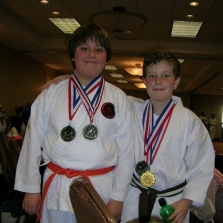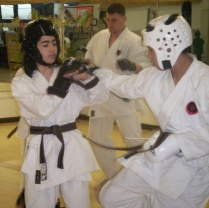 Karate in general, and Goju Ryu in particular, has physical and mental benefits for all people, no matter their age. At Zanshin Martial Arts Center, we aim to adapt karate to the special needs of this age group, focusing on self defense, physical fitness, and respect inside and outside the dojo.
Karate in general, and Goju Ryu in particular, has physical and mental benefits for all people, no matter their age. At Zanshin Martial Arts Center, we aim to adapt karate to the special needs of this age group, focusing on self defense, physical fitness, and respect inside and outside the dojo.
For self defense, our program teaches simple safety rules and preventative measures along with specific defensive techniques. Students learn to recognize dangerous situations and how to avoid them. Karate also develops coordination, strength, speed, and power. These skills are not only great for a child’s overall health and fitness, but are closely tied to the child’s self-esteem and can cross over into other types of exercise and sports. Children who study karate learn respect, self-control, and increased concentration (which often leads to better grades in school). The confidence gained in karate can help children deal with peer pressure. Our programs are also designed to develop children’s social skills, which is especially helpful for shy children.
Kids Karate Class Schedule
- Monday 5:00 – 5:40pm
- Tuesday 5:30 – 6:00pm
- Wednesday 4:45 – 5:15pm / Wednesday 5:15 – 5:45pm (green belt and above)
- Thursday 5:00 – 5:40pm
- Friday 4 – 4:30pm
- Friday 4:30 – 5pm (kids sparring)
- Saturday 10:15 – 10:45am
A Typical Class
Warm Up
This is the first step in a karate class. Stretching exercises are performed to warm up the joints, tendons and muscle groups. Usually lasting about 5-10 minutes, these stretches start with the toes and work upward, finishing with the neck exercises.
Conditioning
After finishing the warm up we follow with some strength and conditioning exercises, usually broken down into upper body, mid section and lower body routines. These exercises are done at a gradual pace so that over the course of time your body becomes stronger, more toned, and has cardiovascular circulation. This builds your ability to develop your karate technique to its full potential. Typical exercises include push ups (upper body) sit ups (mid section) & squats (lower body).

Basics (Kihon)
Having stretched out and warmed up, the class begins to basic techniques, the true foundation of your karate training. This is where students learn all the building blocks of karate: kicks and footwork; locks and throws; and punches and blocks. These are practiced in four basic fashions: stationary; moving; with a partner; and single and combination techniques.
Forms (Kata)
The central component of Goju Ryu Karate, Kata are prearranged forms that allow a student to practice alone, and appreciate the interaction of numerous basic techniques. As students progress they are taught more intricate and complex kata. These forms have been handed down from century to century and can be practiced one’s whole life. Within the movements of a kata are many “bunkai” or self-defense applications that can be broken down and practiced with a partner. Kata is a concrete manifestation of technique, embodying the essence of traditional Karate.
Power / Stamina Training
We use punch bags (hanging bags), focus pads (hand held body shields) and focus mitts (hand-sized targets) to develop and feel our power. In karate many combinations of kicks and punches can be practiced on the pads. This is an excellent way to develop stamina, distance, and power and tone the body.

Free Sparring / Self Defense
This is something that some students like and some prefer not to participate in. It’s up to the individual. Sparring or ‘kumite’ as its called is the ultimate cardiovascular workout – you will break a real sweat during these classes. Sparring develops your understanding of the distance and timing needed for offensive and defensive movement in a loose, non-contact format. Protective equipment is worn by all participants and is practiced in a safe and controlled atmosphere. Free sparring is also excellent self-defense training. Not only does it help build one’s confidence, it helps one develop the physical and emotional reactions needed to deal with a potentially violent situation on the streets.
Mental Development
The psychological benefits of confidence, focus, and discipline are just a few of the areas that transcend karate training to improve a student’s everyday life. The same self-discipline and concentration that children learn through karate training can be applied to schoolwork (which often leads pays off in the form of better grades) or hobbies such as team sports and music. Karate also builds confidence and self-esteem, which give children the courage to say NO in the face of peer pressure. Children who practice karate have a proven track record of being polite, well-mannered, and emotionally balanced individuals who feel like positive and constructive members of society.
Recent Comments